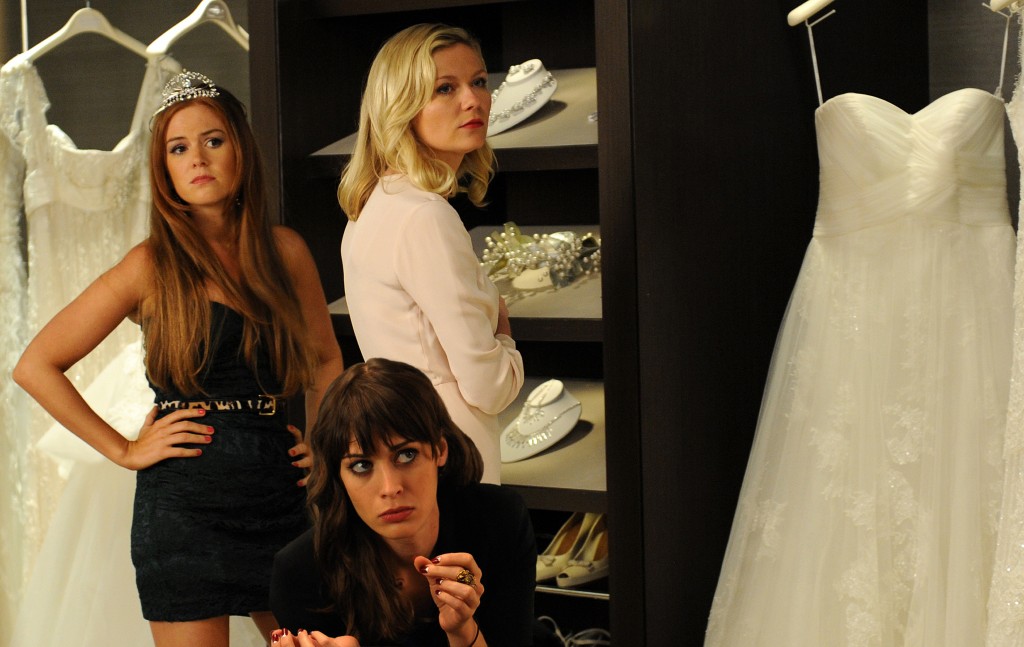Culture
“Bachelorette” behaving badly

Bachelorette
dir. Leslye Headland
Release Date: Sep 07, 12
- 1
- 2
- 3
- 4
- 5
- 6
- 7
- 8
- 9
- 10
“Discomfort” doesn’t even begin to illustrate the emotions aroused by Bachelorette, a dark comedy so caustic and bitter that it gains the advantage of never having to slow down to redeem its ostensible protagonists like far too many dark comedies often do. Like a less assured spiritual cousin to last year’s Young Adult, Bachelorette explores what happened to the alpha females in high school, and also much like that earlier film, it reaches the conclusion that they’ve a) not changed a whole lot and b) have morphed from the sexual/physical envy of their peers to pitiable beings slowly watching life pass them by. Where the two films diverge is in Bachelorette’s devotion to the ritual humiliation of its subjects, a tact that’s definitely funnier, if less emotionally rich.
When Becky (Rebel Wilson) announces that she’s getting married, for some reason she invites Regan (Kirsten Dunst), Katie (Isla Fisher) and Gena (Lizzy Caplan) to her wedding, despite their self-created reputation as the “Bs” in high school (just take a wild guess) and their continued tendency to refer to Becky by her high school nickname of “Pig Face.” To hide from the fact that they’re not particularly likable people, are welcomed by pretty much nobody other than Becky to the wedding and don’t even really want to be around each other, the trio decide to turn Becky’s requested “low-key” bachelorette party into a coke-and-booze-fueled rager of an evening. When the party goes wrong, and their continual hoovering of cocaine leads to a wedding-ruining screwup, Regan, Katie and Gena go on a one-night odyssey to make amends, while also being forced to confront why their lives haven’t turned out the way they wanted.
Writer-director Leslye Headland has a perfect ear for the bitter, catty cutdowns that have sustained her main characters’ continued friendships, however tenuously. That ear is so accurate, in fact, that the film becomes markedly clumsier whenever the focus moves away from the trio of bridesmaids and onto their interactions with a threesome of conveniently placed groomsmen. For Katie there’s Joe, the lovable, awkward oaf (Kyle Bornheimer), for Gena her ex-boyfriend Clyde (Adam Scott), and for Regan there’s the foul-mouthed, swaggering alpha male Trevor (James Marsden). It’s a shame, too, because when examining the inextricable ties broken people keep to one another when on some primal level they know how alone they are, Bachelorette is oddly poignant, especially in a moment between Regan and Becky late in the film after Regan starts to revert to one of her more self-destructive high school behaviors. Whenever the love interests are involved (though all are solid, if given limited material), the film feels noticeably more typical.
Bachelorette also involves a high level of suspended disbelief with respect to its leads being invited to a wedding, or really any social function. Outside of Becky and Joe, virtually nobody in the film is all that likable. It’s a far cry from Bridesmaids, a film to which Bachelorette will be inevitably compared; where in that film the characters could be unlikable but were good people at the core, this film presents the exact opposite, to such a point where it willingly alienates its audience. All three of the bridesmaids deserve their unhappiness, and for all the film’s honest moments acknowledging this (especially in a late-night exchange between Caplan and Scott), Bachelorette traffics in antipathy to an off-putting degree. The film primarily stands as a tale of bad women behaving badly, with only meager rays of hope for any of them having a future that doesn’t involve a continued spiral toward total destruction. How’s that for a comedy about a wedding?